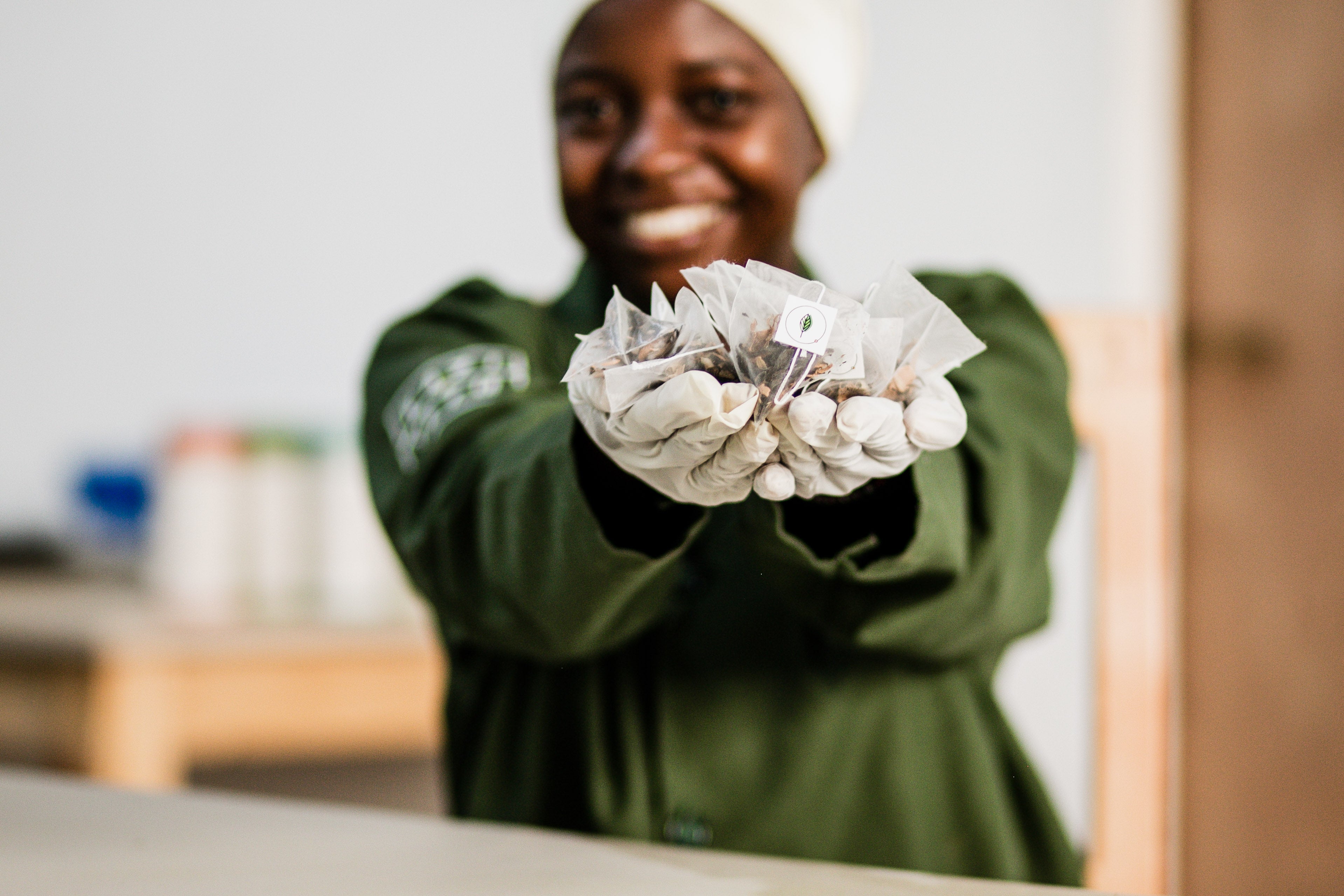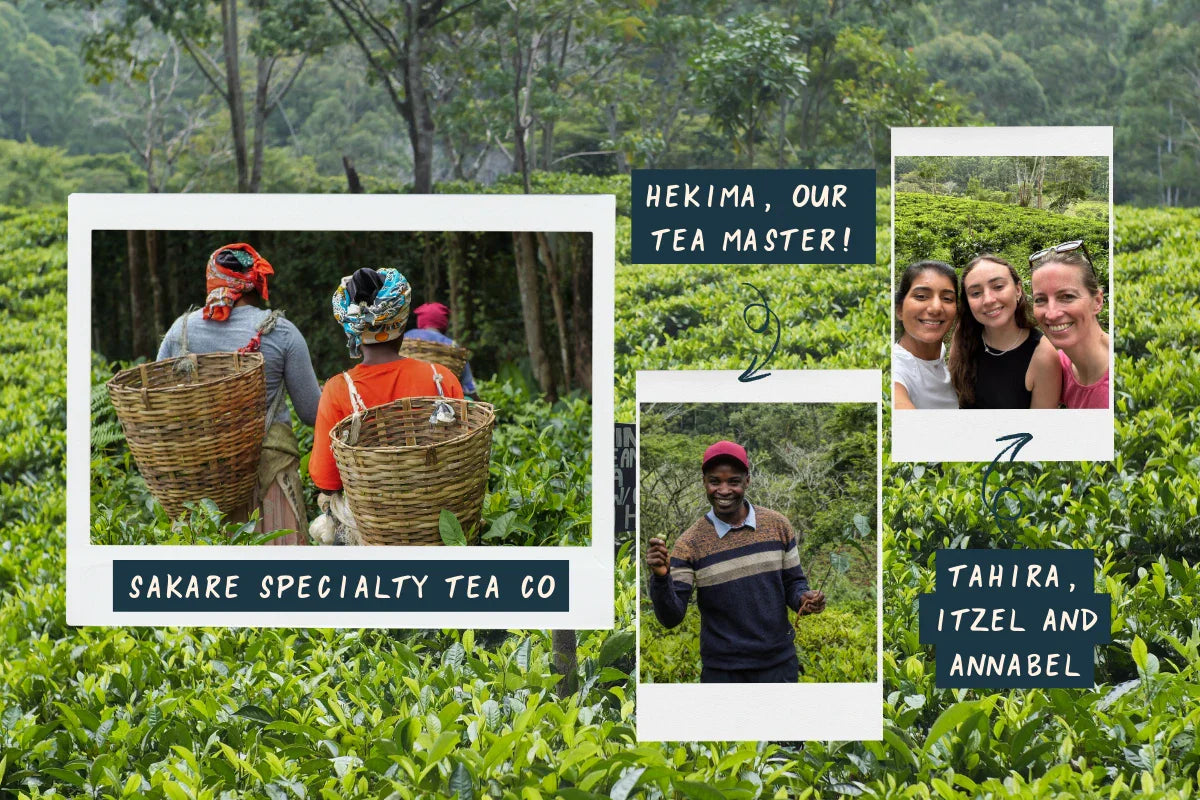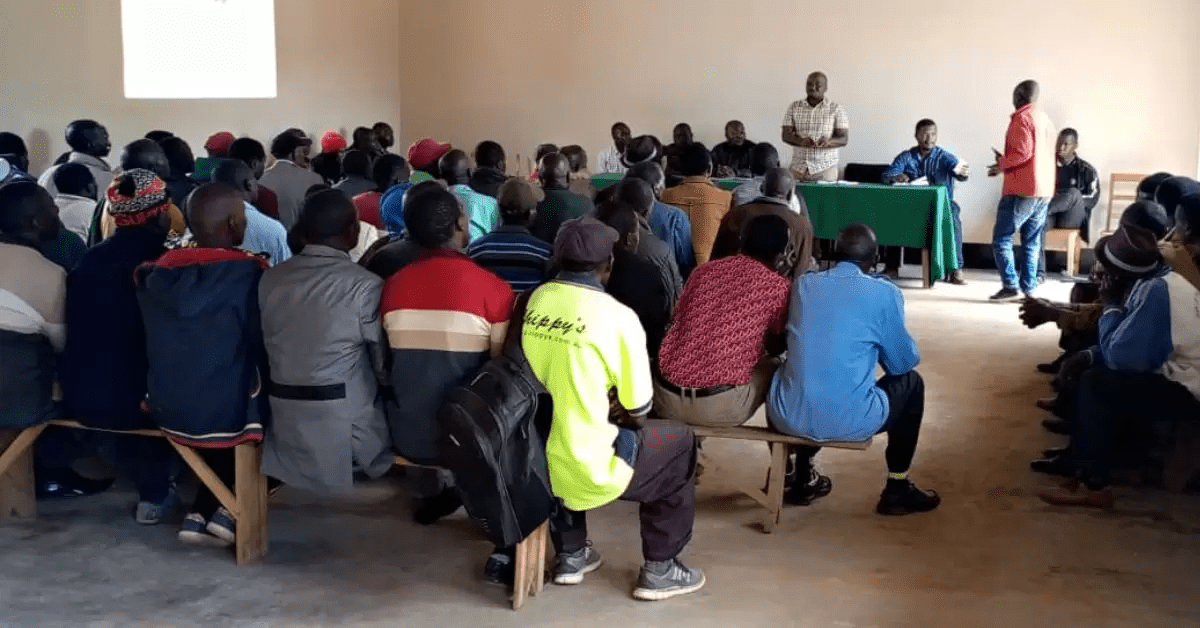Von Tahira, Annabel und Itzel veröffentlicht am Earth Day 2025
Wir waren drei Frauen aus verschiedenen Teilen der Welt – Annabel aus Deutschland, Gründerin von Tea Rebellion ; Tahira aus Tansania und Kanada, Gründerin von Kazi Yetu; und Itzel, die das digitale Marketing für Kazi Yetu leitet. Was uns zusammenbrachte, war nicht nur der Tee, sondern auch die gemeinsame Neugier auf Nachhaltigkeit, regenerative Landwirtschaft und die Schaffung sinnvoller sozialer Wirkung. Also machten wir uns mit Rucksäcken, Notizbüchern und offenen Köpfen auf den Weg ins ländliche Tansania, um die Sakare Specialty Tea Co. zu besuchen – ein Teeunternehmen in Besitz einer Kleinbäuer*innen-Kooperative, das mit Kazi Yetu zusammenarbeitet.

Es war ein nebliger Morgen, als wir Korogwe verließen und uns hinauf in die Usambara-Berge schlängelten. Zuerst dachten wir, es sei Nebel, doch bald merkten wir, dass wir tatsächlich durch Wolken fuhren – dünne, silbrige Schichten, die in kühler Luft schwebten. Jede Kurve der Straße brachte uns höher, und die Märzhitze in Korogwe wich einer erfrischenden Kühle. Unterwegs kamen wir an Bauern vorbei, die ihr Land bestellten und sich in aller Stille auf den kommenden Regen vorbereiteten. Die Energie auf den Feldern wirkte friedlich und zielstrebig zugleich.

Die Landschaft war einfach atemberaubend. Mango- und Orangenbäume säumten die Straße, dazwischen Sisal, Kaffee, Mais und Gemüse. Die Region profitiert von den fruchtbaren vulkanischen Böden des Kilimandscharo – man spürte die Fruchtbarkeit in jedem Grünton, der uns umgab, von hellem Zitronengrasgrün über minziges Smaragdgrün bis hin zu dunklem Verbenengrün. Irgendwann verstummten wir alle vier im Auto und genossen die endlosen grünen Ebenen, die sich scheinbar endlos dahinzogen.
Nach etwa anderthalb Stunden – einem kurzen Stopp an einem Wasserfall und ein paar Schnappschüssen von den Berggipfeln – erreichten wir die Teefarm der Sakare Cooperative. Das Land ist in zwei Teefelder aufgeteilt, die durch einen kleinen Eukalyptus- und Akazienwald voneinander getrennt sind. In der Nähe befindet sich eine Teegärtnerei, und am Rande des Grundstücks steht noch ein altes, verlassenes Haus aus der Kolonialzeit aus den 1920er Jahren mit seinem originalen Kamin – eine stille, eindringliche Erinnerung an Tansanias vielschichtige Teegeschichte.
Der Tee selbst ist Camellia Assamica – eine Sorte, die in diesen tropischen Höhenlagen mit viel Sonnenlicht und konstantem Regen gedeiht. Die Blätter werden hier groß und dick, perfekt für die Herstellung von starkem, vollmundigem Tee. Als wir durch die Felder gingen, huschten Vögel durch die Baumwipfel und Insekten schwirrten um unsere Füße – klare Zeichen eines lebendigen, atmenden Ökosystems. Biodiversität ist hier nicht nur eine Idee; sie ist hörbar, sichtbar und greifbar.

Wir kletterten durch die Bäume hinauf zu Feld 2, einem kürzlich sanierten Teil der Farm. Die Teebäuer*innen hatten das in den Feldern wuchernde Unkraut gedroschen und so eine Deckfrucht und eine Mulchschicht angelegt. Dies verbessert die Bodenfeuchtigkeit, schützt die Erde vor Erosion, führt Nährstoffe zurück in den Boden und beugt Schlangenbefall vor. Dieses einfache, zirkuläre Verfahren ist nur ein Beispiel für regenerative Landwirtschaft in der Praxis – die Nutzung des Vorhandenen zur Heilung und Regeneration des Landes. Es ist zudem eine widerstandsfähigere Alternative zu chemischen Herbiziden, die Pflanzen und Boden geschädigt hätten.
Unten am Hang beobachteten wir die Teepflückerinnen, wie sie sich mit Leichtigkeit und Präzision zwischen den Reihen bewegten. Ihre Körbe waren auf dem Rücken festgeschnallt, und ihre Hände tanzten über die Teebüsche, während sie leise plauderten. Sie pflücken alle zwei Wochen, um die ideale „Tischform“ der Büsche zu erhalten. Dabei wechseln sie zwischen den Feldern, um jedem Bereich Zeit zum Ausruhen zu geben. Alles hat seinen Rhythmus – menschliche und ökologische Zyklen überschneiden sich harmonisch.
Die Sakara Teefarm, die wie eine Schüssel im Tal zwischen den Bergen geformt ist, hat es zudem geschafft, die natürlichen Wasserquellen durch eine Art Hochebene im mittleren Teil des Farmlands sanfter durch die Felder fließen zu lassen. Diese innovative Technik hat sich als sehr effektiv erwiesen, um die Bodenfruchtbarkeit zu erhalten, was ein zentrales Ziel der regenerativen Landwirtschaft ist: die Ausschwemmung von Bodennährstoffen zu reduzieren.
Als wir am Rande des Feldes standen, das Lachen der Pflückerinnen hinter uns und die Vögel über uns, fragten wir uns: Wie wäre es, wenn so die Zukunft der Landwirtschaft aussehen würde? Nicht nur biologisch, nicht nur nachhaltig – sondern regenerativ. Eine Zukunft, in der Böden gepflegt, Ökosysteme wiederhergestellt und Bauerngemeinschaften befähigt werden, die Richtung vorzugeben. Es gibt noch so viel zu verstehen, und wir haben viele Fragen. Aber es gibt auch ein stilles Vertrauen, das an Orten wie Sakare wächst – ein Gefühl, dass etwas Besseres nicht nur möglich ist, sondern bereits Wurzeln schlägt.

Möchtest du mehr über regenerativen Teeanbau erfahren?
Verfolge unsere Reise auf Instagram @kazi.yetu, um die Menschen hinter deinem Tee kennenzulernen und zu sehen, was als Nächstes gebraut wird.
Verfolge auch Annabels Reise auf @tearebellion und erfahre mehr über ihre globale Initiative, das Regenerative Tea Action Project.
Kaufe unseren Tee aus regenerativer Landwirtschaft!




